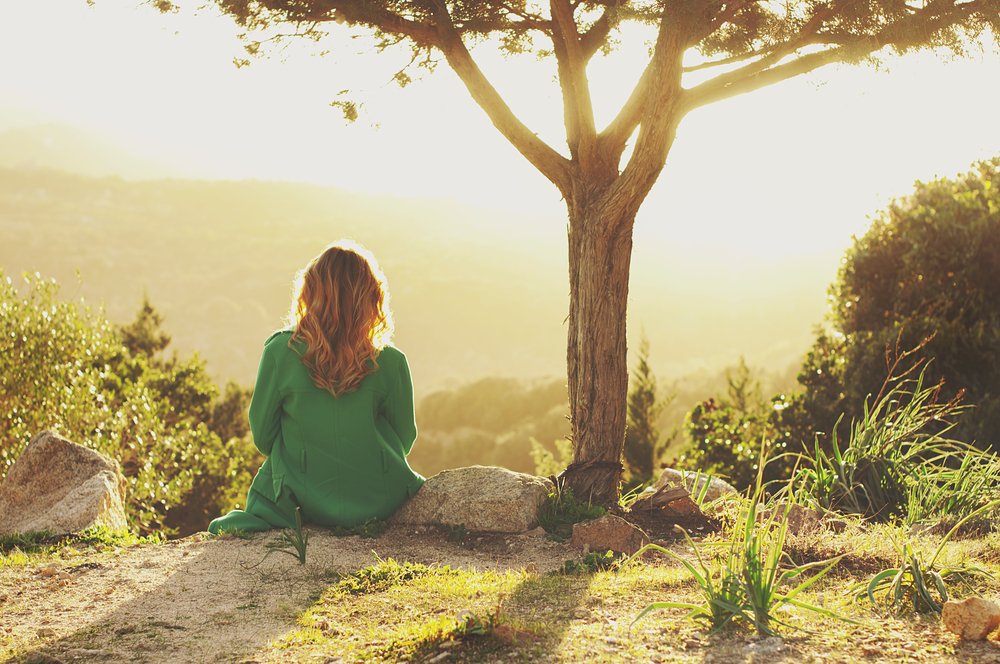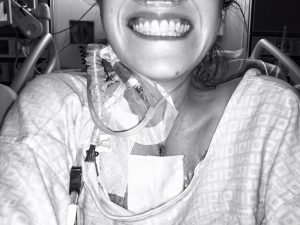Welcome to ‘Not Your Average Rose’ — a Column by Caleigh Haber
Written by |

I have imagined and pushed myself to understand the concept of living a “normal” life, despite having a genetic disease since I was a child. I was diagnosed at birth with cystic fibrosis in June of 1990, the same year the gene was discovered. My mother, father, sister and brother welcomed me into the world for several moments before I was taken away for surgery. Only a few hours after being born I was given the opportunity to be a fighter for the very first time.
My family received the news their infant child had a progressive disease that, at the time, the age of survival was only 10 years after surgery. Growing up, I was mostly healthy and minimally effected by my then-non-advanced disease. I participated in sports, social activities, school, camping, and long sunny days with friends and family along the California coast. Being raised alongside two healthy children, my parents never treated me differently. This probably is one of the things for which I am most grateful to my parents, because it taught me to be confident with who I am. And, who I am includes having cystic fibrosis.
As a child in elementary school I was aware of my disease and very open about what I believed my disease was to everyone I encountered. My mom purposely entered me in private school because she viewed having an on-campus nurse vital to my health. I would wake up early for school, get dressed into my blue-and-white jumper uniform, take my pills, and go to school.
Upon arriving, I was exactly like all the other children my age. My favorite “class” was recess, and my least favorite requirements were reading and writing. Every day the bell rang for recess I would rush to the nurse’s office to take medicine. People with cystic fibrosis have difficulty digesting nutrients and fats from food, and are therefore forced to take supplemental pancreatic enzymes to absorb nutrients and gain weight.
The first few years of school I wasn’t able to swallow capsules myself, and would arrive to the nurse’s office for my pre-prepared applesauce mixed with enzymes inside. The only way to get all my pills in at that stage was to dissolve them in food. I would eat the entire applesauce, then join my classmates for more snacks and playtime. None of my peers really asked questions, although they knew I was different. I assume at that age the main focus is playing and making friends, more so than investigating the medical issues of their friends.
My health matured drastically my second year of high school. I was on the cheerleading team and took part in many school clubs, including the Make-A-Wish club and cystic fibrosis club. My morning routine was similar. I would rise early to get ready for school, eat a large breakfast, take my pills, do breathing treatments when needed, and get a ride to school with my brother.
I had cheerleading practice every day for three hours and weekends were full of games, competitions, and parties. My personality was of a very excited social butterfly. My sophomore year of high school, however, was the first year I was hospitalized, due to loss of lung function and multiple infections.
A turn for the worse
In the following two years, my health deteriorated more. I would spend weeks at a time in the hospital, and unfortunately I fell behind at school. My teachers didn’t seem to understand how challenging of a disease CF can be. Despite missing school and social events, I graduated high school and moved to San Francisco to pursue my dreams of entering the culinary industry.
It took me almost two years to graduate with a degree in patisserie and baking. My absence throughout schooling became challenging, as my disease progressed with age. I often would be questioned by my peers about why I was dropping classes, and joining new classes weeks later. People would ask what cystic fibrosis was. When I would describe my disease to them, I always would play it off as not being as serious as my health already was.
Upon graduating I was fortunate to work at some of the most well-known and successful kitchens in the city. I put my career first, and spent 13-16 hours a day focused on the physically demanding job of being a pastry cook. After only a short time, I became very ill and had to take time off for an emergency hospitalization. At that time, all my hopes went into fighting to return to my dream job and the people who surrounded me. However, I never got a chance to return and went home from the hospital on hospice only a few weeks later.
Hospice is only a treatment for end-of-life healthcare. It hones in on putting a patient’s comfort and quality of life first — above medical treatment. Going home, I no longer had my passion, or friends I could go out with and participate in “normal” activities for a 22-year-old. I went home on 24-hour supplemental oxygen, a feeding tube to maintain my weight, and some pain medications to take the edge off my dying body. This was the first time I had no choice but to face my disease head on. Me, my family, and my peers realized I wasn’t “normal,” no matter how hard we tried.
Life-saving surgery
After two years, I was finally healthy enough to qualify for a double lung transplant. This is when I began to view my health as a positive within its “abnormal” being. My loss in party “friends” allowed me to understand who my true friends really were, and my focus on changing my life to put my health as first priority gained me respect from my healthcare team.
My mom and brother relocated to San Francisco to help manage my health. I was still too weak to prepare meals and care for myself independently, having a lung function of only 16%. During this time my relationships with each of them became much closer. We learned how to function as a team. How to pick up one another after tough news was presented to us. How to fight through any and all obstacles. How to take advantage of the good days together.
Every day I woke up was different. Many of the 565 days I waited for new lungs were filled with clinic visits and living in the hospital, which quickly became our second home. The days we spent at home tended to be full of movie marathons, eating or escaping reality. If I woke up tired, we stayed at home all day. If I felt inspired and energized, we took a drive to the beach, crossed off a bucket list item, or ventured to watch the sunset. I learned that focusing my energy into new hobbies such as painting, writing, and running a foundation could fill the creative void that appeared when I had to stop working.
After 18 months I finally got my call for transplant. It was 1:40 a.m. on Friday, Oct, 20, 2015, when the lung and heart transplant team called me to accept donor lungs. Within 20 minutes we had picked up my brother at his house, made the 45-minute drive to the hospital, and texted all our friends and family that the day we had been waiting for had finally arrived. I thought of all the nights I stayed home crying because I couldn’t go out with friends, and all the tough experiences my family went through because of me, and put absolute hope into a better future.
Within 11 days I was discharged from the hospital with new shiny lungs, and a new perspective on my mental capacity against obstacles. My appreciation for life was unparalleled to previous, and my gratefulness to my family and friends for being a source of support was unmatched to anything I have ever felt.
The truth is we are all different and special in our own ways. But living every day with cystic fibrosis, with the choices we make as chronically ill patients, forms us into the people we are today, and will be tomorrow.
After receiving a double lung transplant, being medically evacuated from vacation to Hawaii back to mainland, surviving five different methods of life support, waking up from a month-long coma, numerous surgeries and procedures, and being hospitalized more times than I can count, I am grateful for the life I live today.
I understand that being “normal” isn’t always the best way to live, and by the “abnormalities” that fill our lives, we can become better and more knowledgeable individuals.
***
Note: Cystic Fibrosis News Today is strictly a news and information website about the disease. It does not provide medical advice, diagnosis, or treatment. This content is not intended to be a substitute for professional medical advice, diagnosis, or treatment. Always seek the advice of your physician or other qualified health provider with any questions you may have regarding a medical condition. Never disregard professional medical advice or delay in seeking it because of something you have read on this website. The opinions expressed in this column are not those of Cystic Fibrosis News Today, or its parent company, Bionews Services, and are intended to spark discussion about issues pertaining to cystic fibrosis.








Laura Clark
Caleigh, this is a beautiful essay you wrote. We know now, part of what you went through, and are so proud of you, to be able to write this, and explain what you were going through. It is a horrible disease, and I pray they find a cure for it soon. I have enjoyed all your posts, but this is the best. You are one strong woman, and have a great outlook on life, which helps the body heal, also.Your family being so close to you, also helps, and God will bless you and them.Please take care, and stay strong. Love you.